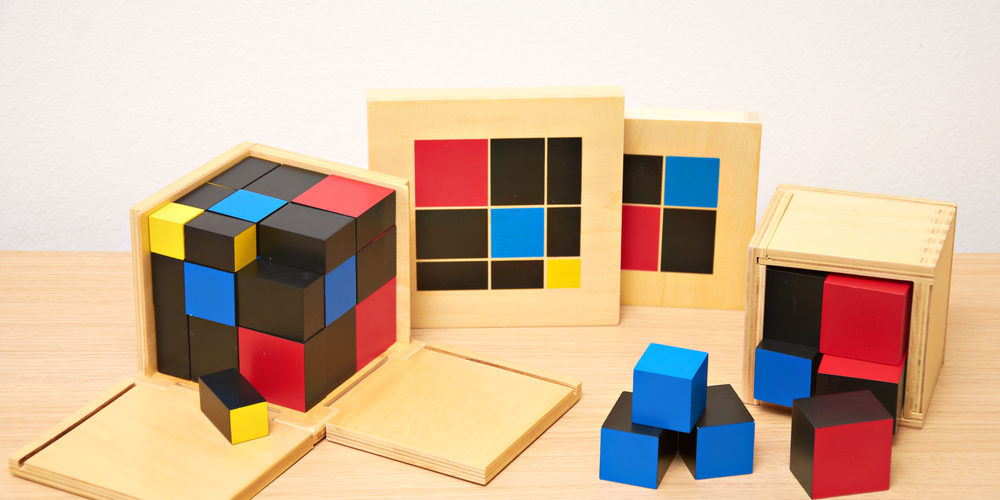When you are looking for preschool programs for your child, you want to choose only the very best. This is going to take a little research on your part, as there are many philosophies and teaching practices out there. That said, Montessori preschool is an excellent fit for most children, as it provides a child-centered approach to education and promotes independence.
Here is what you need to know about Montessori preschools, so you can decide if it’s a match for you and your child.
The Montessori Philosophy
The first thing you should know is that Montessori is not like traditional education. A child-centered approach refers to viewing each student as an individual with unique strengths and weaknesses. Furthermore, Montessori preschools focus on the development of the whole child instead of just academics.
Montessori classrooms are multi-age and generally have an age range of 2-3 years between the students. So, for instance, some Montessori preschool programs have children between 3-5 years old. This is meant to foster leadership and communication skills between older and younger children.
Another defining characteristic of a Montessori preschool is the teaching method. While there are instructors walking around, children are encouraged to learn from one another, too. Furthermore, instead of lecturing, the teachers will guide activities, act as role models for correct behavior, and make suggestions to the children.
Inside the Montessori Preschool Classroom
Dr. Maria Montessori, the founder of Montessori, believed that the environment played a tremendous role in a child’s development. That is why part of the Montessori philosophy is devoted to the Prepared Environment. Within the preschool classroom, there are plenty of hands-on materials for children to use, including blocks, beads, puzzles, and books.
The classroom is organized and has plenty of open space. Designated sections surround the room, including a reading corner, kitchen, and spaces for mathematics or language arts. Materials are spread around these learning spaces.
Once a child is done using the learning materials, they return it to its appropriate place on the shelves. Should you visit a Montessori school for a tour, you will also notice that everything in the classroom is child-sized, from the chairs to the utensils.
Goals of a Montessori Preschool
Montessori education is all about discovery at your own pace. For children, this means getting uninterrupted work time for about 3 hours. Outside of those blocks, children are lead through a curriculum meant to stimulate their creativity. Subjects include:
- Practical life. Children perform everyday tasks, such as learning how to button shirts, take off their coat, dressing, pouring drinks, cleaning up after eating, sweeping the floor, and how to organize a space. These practical life skills are meant to help develop independence and confidence.
- Cultural. Children discover the world through science, art, movement, literature, and music. This helps students understand the meaning of community within the classroom and beyond.
- Sensorial learning. The senses are engaged with colorful Montessori materials. Students learn colors by using blocks or different textures by trying different foods. There is also time spent outside among nature, where students can learn how to garden or about the natural world with their own eyes, ears, and hands.
- Language. Using a variety of materials that engage the senses, such as sandpaper letters or tracing letters with their fingers, children learn their letters, how to express thoughts and feelings, and start building up a more complex vocabulary.
- Mathematics. Hands-on materials teach children basic math concepts, such as placing the correct number of wooden rods into a box marked with several numbers.
How to Find a Great Montessori School in Philadelphia
Now that you know about Montessori preschools, how do you know the programs near you are truly Montessori and good for your child? Before enrolling your child into any program, engage with the school and the teachers. You should see classrooms with mixed age groups. Montessori schools also have 3-hour blocks of uninterrupted play with Montessori materials. Some supplemental programs will use non-Montessori materials, such as Lego bricks.
Next, check if the teachers have certifications from a Montessori Accreditation Council for Teacher Education accredited organization. Credentials from the American Montessori Society (AMS) is also a good sign.
Ultimately, finding a great Montessori preschool program for your child comes down to instinct. Are the students happy? Does the atmosphere feel right? Are the teachers caring and nurturing? If you have a good feeling about a program, then trust in your intuition and give it a try.
Ready to Enroll Your Child in a Montessori Preschool Program?
Having gone through what to know about Montessori preschools, you should have a clear idea about what to expect. The best way to tell if a Montessori program is right for your child is to take a tour and talk to the teachers. Remember, Montessori is more than education, it is also a way of life for many, so you should check that your schedule is also compatible.
Fishtown Montessori is inviting parents to take a virtual tour of our school and preschool program. Our certified teachers have created nurturing classrooms full of laughter and discovery. Give us a call or sign up for a tour online today. We look forward to meeting you.






